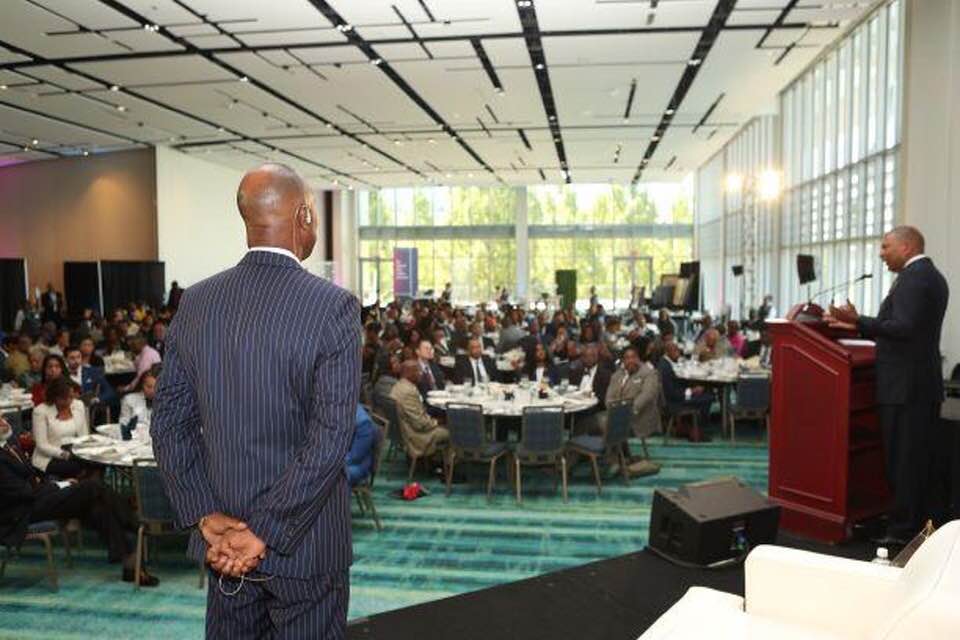Business
Minority Businesses Are on the Rise and Need More Support from Their Communities

Nicole Donaldson Hunter is a rarity among Black business owners in America. She entered a field that is dominated by women, but one that is governed by few of them.
Hunter, who worked as a mortgage underwriter for several years, was left without a job after the financial crisis in 2007-2008. She decided to start her own tax service – becoming part of the growing number of women who have started their own business.
“I no longer wanted to be in a position where I couldn’t help myself,” Hunter said. “I decided that I was going to drive my own destiny.”
According to the U.S. Census Bureau’s 2016 Annual Survey of Entrepreneurs, women-owned employer firms in the United States increased by approximately 2.8 percent between 2015 and 2016.
This week, Hunter and other minority business owners are being recognized through National Minority Enterprise Development Week, which was first observed by President Ronald Reagan in 1983.
“Minority-owned businesses are helping to power the engine of American capitalism,” Trump said. “The ambition of minority entrepreneurs secures a better future for their families, their communities, and the Nation. This week, and throughout the year, we celebrate the great achievements of our minority-owned businesses.”
Also known as National MED Week, it is formally celebrated each year by the Minority Business Development Agency, which is in its 50th year, as part of the U.S. Department of Commerce. National MED Week recognizes and celebrates the achievements and contributions of minority businesses to America’s economy.
“When President Richard Nixon signed the Executive Order creating the Office of Minority Business Enterprise in 1969, the Nation’s minority population was less than 40 million,” Trump said. “Today, the minority population has more than tripled to 130 million, or more than 39 percent of the total American population. Minorities own almost 30 percent of America’s businesses, which employ 7.2 million Americans and generate over $1 trillion a year in revenue. Indeed, the number of minority-owned businesses in operation nationwide has increased by 38 percent since 2007.”
The Survey of Entrepreneurs found that 1.1 million of the 5.6 million firms with paid employees are minority firms and they employ 8.7 million of the total 121.1 million paid employees.
Why Buying Black Changes Lives
By 2044, the nation’s prosperity will rely even more on minorities, the fastest growing segment of the population, according to the U.S. Census Bureau.
Still, “most of them are mom-and-pop operations,” said Ron Busby, who founded the U.S. Black Chambers 10 years ago. “They don’t have employees. If you look at the 2.6 million Black firms that are owned and operated by an African-American, only 2.5 have at least one employee.”
There is a need for improvement, said Busby who is president of the organization that many consider the ‘Voice of Black Business.’
“We have the least number of businesses and the smallest amount of gross revenue, and we employ the fewest number of people,” Busby said.
U.S. minority business enterprises represent 29 percent of all firms but only 11 percent have paid employees, according to the Bureau. If MBEs were to obtain entrepreneurial parity, the U.S. economy would realize 13 million more jobs.
Busby underscores the value of supporting Black-owned businesses as a way to create more jobs and reduce unemployment.
“Currently, Black Americans spend three percent of their dollars with Black-owned businesses. If we would increase that just seven percent, our businesses could employ at least one person. And, we could eliminate unemployment in our community and take care of our own.”
Hunter has one employee whom she hired to work the desk at her office in East Point, Georgia. And when she started her business, she didn’t do it alone. She and her husband started with 20 clients, mostly family members, friends and acquaintances. While working 10- to 12-hour workdays, they were able to grow United Tax Service into a company with 300 clients, 200 of whom are consistent, Hunter said.
But Hunter didn’t stop there. She decided to become a licensed real estate agent. She renovates and sells properties. She uses one property as an Airbnb and she’s getting ready to build a couple more properties, she said. Her enterprise was recognized by a real estate investor group, which invited her to speak about how to do multiple streams of income.
“One business is not going to feed you,” Hunter said. “You have to have multiple businesses to be successful.”
And Busby would agree. “Start a business, but I’m not saying, ‘Quit your job.’ In this environment, you need multiple streams of revenue,” he said.
Still, Busby sees another area that needs improvement.
“It’s important to start a Black-owned business but just as important to support a Black-owned business,” said Busby, whose organization recently held its annual conference, which focused on local Chambers of Commerce, millennial business owners, and medium-to-large companies.

-

 Featured10 months ago
Featured10 months agoCalifornia Is the First State to Create A Public Alert for Missing Black Youth
-

 Featured9 months ago
Featured9 months agoAfrican American Leaders Stay the Course Amid Calls for President Biden To Bow Out of Race
-

 Featured10 months ago
Featured10 months agoThe Debate Fallout Lands on Both Candidates
-

 Featured9 months ago
Featured9 months agoPresident Joe Biden Decides to Withdraw from the Presidential Race
-

 Featured9 months ago
Featured9 months agoIn One of His Final Speeches as President, Biden Says It’s Time for ‘Fresh Voices’
-

 Featured9 months ago
Featured9 months agoPresident Joe Biden Describes Shooting of Donald Trump As ‘Sick’









